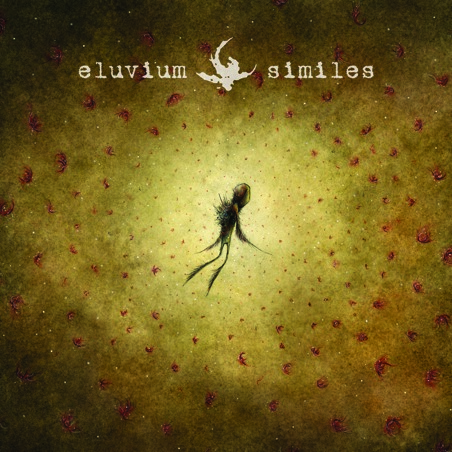
Eluvium
Similes
(Temporary Residence; 2010)
By Chet Betz | 5 February 2010
After some minimal piano experiments and incredible ambient albums Eluvium’s Matthew Cooper gained some new fans but threw off some old ones with 2007’s Copia. Cooper was attempting to stretch out, increasing the variety of instruments to include brass and strings and bringing more pointed melodies to the foreground, but the end result—for me, at least—felt a bit gimmicky, too soundtracky, and overall disjointed. It wasn’t horrible or anything, I just suddenly found myself completely uninterested in whatever it was Cooper might do next, thinking that Copia was a surefire sign that he’d abandoned the delicacy and ambiguity of his genre of origin for instrumentals with a bit more maudlin mass appeal. And while it’s now apparent that Copia was a transitional album, for sure, it was also apparently something of a misdirect. Because, sheesh, Similes adds vocals and songwriting and shit but it’s somehow more of an ambient album than its immediate predecessor while at the same time subtly tinkering with the ambient dynamic in more fundamental ways. It’s both striking and unassuming and, all told, a collected effort whose intensity of focus rivals that of the seminal Talk Amongst the Trees (2005).
Probably the most blatant “new” thing going on here is Cooper’s vocal presence, and he’s not singing Eluvianish or Cooplandic or some made-up language that we can easily ignore and chalk up as just another instrument in the mix; nope, he’s singing real words. Real words that make up real sentences that make up some real heady stuff about how we experience reality and sources of inspiration and, like, Big Ideas. What makes this palatable and appropriate is that Cooper has one of those lovely “manly lullaby” timbres, the calm ache of a gentle baritone singing couplet melodies that reminds one a bit of Bill Callahan or the National on sleepers. So that’s the obvious affront to traditional ambient values but the real subversion takes place in how Similes forsakes some of ambient’s build and even some of its nuance for a pretty potent form of stasis, the bliss moments that you’d find half a dozen minutes into a Keith Fullerton Whitman track presented here up-front and elongated, the slightest of tweaks drawing us in only deeper and deeper into what effectively are very unified soundscapes; what comes to mind most immediately are the delays, channel pans, and gain shifts that incrementally alter the shape and impact of the climactic effect in “Cease to Know”—there’s no clear “progression” to speak of, only repetition cycled through constant yet minute change.
Which brings me to the old idiom: the more things change the more things stay the same. As pertains to this record’s relationship to ambient, the saying’s true in a way that’s actually kind of exciting. What’s happening with Similes is that it’s doing everything ambient music is supposed to do but is finding a very forward and fresh manner of going about it. It certainly passes the test of heightening perception: I was forcing some new life into a gimpy tire on a cold night and “Leaves Eclipse the Light” through my headphones made me feel like I was meditating on a star-kissed mountaintop. The air machine chugging away behind me, my own breath vapors in my eyes, the moving lights from an emergency vehicle to my right and the roadway traffic to my left playing at the corners of my vision, which was focused upon the tire now slowly growing back to normal girth—the entire sensory interplay rendered by the music into complete, almost tidal rhythm. These are the kinds of experiential details that ambient music is so good at imbuing with simple grandeur or ineffable pathos, and though Cooper is changing the game with Similes, the fact that it still fulfills this basic ambient function as well as any other ambient record makes it something of a remarkable achievement in boldly broadening a genre paradigm without losing one iota of that genre’s vital essence.
And the ultimate effect that this music intends and most definitely does have on one’s inner state is very positive. If I had to pin one overarching concept to Cooper’s lyrics it would be something of a philosophical dissection of the very substance of peace, which is a ridiculous yet awesome endeavor on his part. There’s this unspoken assertion of peace as an absolute and then the relation to that of physical manifestations which can but may not necessarily be evocative of peace. For peace as an idea is elusive and as an experience even moreso if one is on the outside looking in. But inside peace feels total and boundless. The title of “The Motion Makes Me Last” gives it away as if one of its central lyrics—“I’m a vessel between two places I’ve never been”—isn’t enough; peace is found in an embrace of the ephemeral, in becoming fully invested in the journey of the moment since the origins and destinations of past and future have no substance and in a way do not even exist for us. But (and I think specifically again of “Cease to Know” but the whole record is an accomplice) the serenity of this music betrays the common trappings of “live for today” art or pop culture, making Similes something less about gratification and more about elevation, of reaching for the eternal moment that ripples as a circular current above our linear flows of time. So it’s existential in Kierkegaard fashion, basically.
Aesthetically working together with these conceptual “similes” are the lines that Cooper draws between disparate music genres, exposing some core purposes in ambient and singer-songwriter folk that are in perfect harmony and using that harmony exhaustively to get his rather beautiful if somewhat cheesy point across. See, Eluvium has no more need for gimmicks; this record is relentlessly self-assured that its placidity will speak to the soul. And speak it does. I’ve never heard anything quite like Similes.





